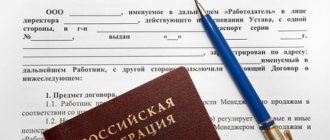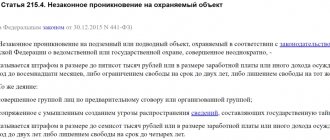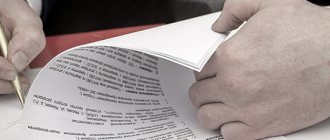What should you do if you find out that an agreement has been concluded on your behalf and your signature on it has been forged? This could be a loan agreement in which one of your loved ones signed for you, issued a loan, and you became a co-borrower. There may be a purchase and sale agreement, a lease agreement or any other. Such situations are not uncommon.
Your actions will depend on the circumstances in which you learned about the existence of an agreement with a forged signature, and at what stage the case is at. Let's consider typical situations and sequence of actions.
Situation 1 – Legal proceedings have not yet been initiated under an agreement with a forged signature
For example, you found out that your spouse took out a loan for you and himself, signing for you in the loan agreement. Unfortunately, this happens. If you do not agree with this situation, you have the right to contact the bank with a statement that you did not sign the agreement and are not a co-borrower. The bank has two options: either reconsider the terms of the loan or refuse you. Not answering anything is, in fact, also a refusal. And then you will face a judicial procedure for declaring the contract invalid or unconcluded.
How to raise the question - about the invalidity or non-conclusion of the contract - depends on the situation. Typically, judicial practice considers an agreement with a forged signature to be unconcluded. But if there is a borrower in the agreement besides you, whose signature is not disputed, then it is better to raise the question of invalidating the agreement.
As a sample when preparing a claim, you can use statements of claim in the cases of our clients, inserting your data into them.
Claim to invalidate a loan agreement or mortgage agreement (falsified signature)
Claim to invalidate the surety agreement (fake signature)
Decisions of lower courts
The Tverskoy District Court of Moscow decided that the seller’s mother-in-law evaded conducting a forensic examination. And without it, it is impossible to resolve the issue of falsification of documents. Therefore, the court found it established that the plaintiff signed the disputed agreement. And since she knew about the sale back in 2010, she went to court with the statute of limitations missing. The first instance also rejected the final buyer, because the arguments of the counterclaim have no legal significance. The appeal agreed with this, but not the Presidium of the Moscow City Court, which pointed out the contradiction. Although the expert made an unambiguous conclusion that the plaintiff did not sign the agreement, the courts came to the opposite conclusion. Therefore, the matter was returned to a “new circle”.
Situation 2 – There is a lawsuit underway regarding an agreement with a forged signature, but there is no court decision yet
If you intend to challenge a contract with a forged signature in court, pay attention to the following.
- Organize and conduct a preliminary examination of the forged signature.
Before submitting a claim to the court (or explanations, if the process is already underway), you need to conduct an appropriate handwriting examination. Moreover, this must be done on your own initiative and at your own expense in order to justify your position before the court. For Russian courts, only documentary evidence has always mattered, and an expert’s opinion is a very significant argument.
- What must be submitted for examination of a forged signature?
First, the disputed contract with signature. Here you need to keep in mind the nuances related to whether you have the original contract or just a photocopy of it.
If there is no original, this is not a problem; this does not interfere with the examination. However, in the copy the signature being examined may not be legible enough. In this case, the conclusion will be probabilistic: the expert will indicate that the signature was “probably” made not by you, but by another person.
If the signature in the photocopy is legible, then there are no problems, the expert will write an unequivocal conclusion that the signature was not made by you. A probabilistic or unambiguous conclusion at this stage is not of particular importance, because by court decision, another examination will still be carried out. More on this later.
To conduct the research, you will need to provide samples of your signature. Firstly, experimental samples - for this you just sit down at the table right in the expert organization and write down several sheets of paper. Secondly, documentary samples. To do this, you need to find documents relating to the period when the disputed agreement was concluded, with your valid signature. These could be receipts for payment of utility bills, an employment contract or other documents from your place of work, signatures from bank statements, etc. Think in advance where you signed and prepare these documents for the experts.
- Prepare for forensic examination.
To verify your arguments, the court will order a forensic examination, and based on its results it will make a decision. Therefore, you need to find a second expert organization in advance and discuss with their employees the possibility of conducting an examination based on a court decision.
At the same time, it is not a fact that the court will order a forensic examination there - it can choose experts proposed by your opponent (if he proposes them). However, you can confidently petition the court to select the expert institution indicated by you, especially if you provide their consent to conduct such an examination and provide payment for their services, and to submit the questions you specified to the expert for resolution. Therefore, it is important for you to agree on all this with experts in advance.
So, having prepared evidence of a forged signature in this way, you can count on the court to make a decision to declare the contract invalid (not concluded).
Circumstances of the dispute
In 2009, the woman began looking for an apartment in the center of Moscow and, according to her, met a certain man who was selling his mother-in-law’s home.
As a result, on May 14, 2010, the woman made a purchase. Axioma LLC provided legal support for the transaction. The purchase and sale agreement was signed at the company's office. The owner herself was not there. According to the woman, she, her son-in-law and a company employee were present. The seller gave the latter a power of attorney to collect the necessary documents for the sale of the property and register the purchase and sale agreement. The real cost of the object was estimated at 35 million rubles, but only 1.6 million rubles were indicated in the contract. According to the new owner, she did not move into the new apartment; the seller and his wife temporarily settled there, PRAVO.ru reports. Five conditions have been named for exemption from personal income tax when selling housing
Read more…
Seven years later, in May 2017, Kovaleva sold her home to another man. And at the end of June, the previous owner went to court to declare both transactions invalid and return the apartment (case No. 2-0085/2018). Her version of events was different from what the customer said. The woman insisted that she didn’t really want to sell anything, she didn’t sign the contract dated May 14, 2010, she wasn’t present during the transaction and didn’t receive money from the buyers. According to her, the buyer falsified the contract. The woman allegedly learned that she had lost her property rights only in 2017.
note
The will of the plaintiff to alienate property is essential in such disputes, say experts interviewed by PRAVO.ru. The expert was interested in the fact that the court attached greater importance not to the directly expressed will of the plaintiff, but to the will expressed in actions. Handwriting examinations confirmed that the seller’s mother-in-law did not sign the contract. Formally, this should have “destroyed” the integrity of the counterparty. But the courts delved deeper into the situation and drew attention to the fact that three days before the transaction, the plaintiff issued a notarized power of attorney to a professional realtor to collect documents and certificates necessary to conclude a contract for the sale and purchase of an apartment. Therefore, the court was critical of the plaintiff’s argument about the lack of desire to alienate the property, the expert explains.
Then the last owner filed a counterclaim against her to recognize him as a bona fide buyer. The man claimed that when purchasing, he checked the seller’s credentials and was sure that the transaction was “clean.” The woman who bought the apartment was also convinced that everything would go without problems. According to her, negotiations regarding the sale of the apartment were conducted by the plaintiff’s son-in-law. But the son-in-law himself now denied this and insisted that he learned about the sale of real estate at the same time as his mother-in-law.
Then the court conducted a handwriting examination of the contract given by the buyer. An expert from the Institute of Forensic Science of the Center for Special Equipment of the FSB of Russia concluded that it was not the seller’s mother-in-law who signed the document, but someone else. After this, the first instance decided to order a handwriting examination of a copy of the agreement, which was stored in Rosreestr, and a power of attorney addressed to an employee of Axioma LLC. The plaintiff's representative asked for a break to prepare questions for the expert. But neither one nor her client came to the next meeting.
Can a widow claim income not received by her husband?
Read more…
Situation 3 – A court decision was made under an agreement with a forged signature, but it did not come into force
If a court decision has already been made under an agreement with a forged signature, which imposes an obligation on you for which you did not sign, but it has not yet entered into force, urgently write an appeal.
A decision that has entered into force entails the possibility of enforcement proceedings, so your task is to postpone the appearance of the bailiffs for as long as possible.
In your appeal, present all your arguments as described in the previous paragraph. And justify why you did not present them in the first instance - or, if you did, why the court did not take them into account.
As a sample when preparing an appeal, you can use complaints from our clients.
Appeal against a decision to foreclose on a loan or foreclose on an apartment (fake signature)
Petition to reinstate the time limit for filing an appeal (falsified signature)
Punishment under the Code of Administrative Offenses of the Russian Federation
Forgery of a signature is punishable under the Code of Administrative Offenses of the Russian Federation in two cases:
- If the offense is committed by a legal entity, since the organization cannot be held criminally liable. In this case, the court takes into account Article 19.23 of the Administrative Code, which provides for a fine of up to 40 thousand rubles and confiscation of property with which illegal actions were committed.
- If there is a forged signature in the documents of the election campaign, but this did not entail serious consequences and was not carried out using threats and bribery. Article 5.46 provides for liability in the form of a fine of up to 2.5 thousand rubles.
Administrative liability does not provide for other penalties.
Situation 4 – Enforcement proceedings have been initiated under an agreement with a forged signature
Here the situation is, of course, more complicated. If you have already been recognized as a debtor under an agreement with a forged signature and the court has made a decision to collect the debt from you, then you will have to return the attention of the courts to the very beginning of your story, while at the same time fighting off the bailiffs.
What to do in this case?
- File a claim to invalidate an agreement with a forged signature. And act according to the scheme described in situation 2.
- Apply for the suspension of enforcement proceedings until the court makes a decision on your claim about the invalidity of the contract.
Formally, you do not have grounds for suspension in connection with filing such a claim, but you can refer to paragraph 1 of part 2 of Article 39 of the Law “On Enforcement Proceedings” or challenge the decisions of the bailiff. It all depends on your skill in applying the rules on appeal. Essentially, your task is to wait for the decision to invalidate the contract, on the basis of which a reversal of execution will be possible.
As a sample, you can use the documents prepared by us to protect the rights of our clients, inserting your data into them.
Administrative claim against the bailiff (official forgery)
Complaint against a bailiff to the Federal Bailiff Service (official forgery)
Responsibility for forging a signature – article of the Criminal Code of the Russian Federation
Responsibility for forging a signature is provided for by 3 articles of the Criminal Code of the Russian Federation:
- Article 142 – for forgery in documents of an election campaign or referendum, committed by an organized group or using threats and bribery, or resulting in serious consequences (falsification of election or referendum results).
- Article 233 for forging a doctor’s signature on a prescription.
- Article 327 – signing for another person in a contract or other documents, or knowingly using forged documents. Covers a wide variety of types of documents that release or grant rights and obligations.
Here's the danger of forging a signature under Article 142:
- A fine of up to 500 thousand rubles, or in the amount of the convicted person’s income for 3 years.
- Deprivation of the right to hold any position for a period of up to 5 years.
- Up to 4 years of forced labor.
- Up to 4 years of freedom decision.
The court chooses one of the specified measures.
Article 233 provides:
- A fine of up to 80 thousand rubles, or in the amount of income for 6 months or less.
- Correctional labor for up to a year.
- Forced labor for up to 2 years.
- Imprisonment for up to 2 years.
Also, some form of punishment may be combined with deprivation of the right to engage in medical activities if the forgery was carried out by an official.
Liability is provided only if the forged prescriptions made it possible to purchase a psychotropic or narcotic substance.
According to Article 327 of the Criminal Code of the Russian Federation, criminal punishment for forging a signature (for individuals):
- For forgery - forced labor, restriction or imprisonment for up to two years.
- Forgery in order to facilitate the commission or concealment of another crime - forced labor or imprisonment for up to 4 years.
- For using a fake document - a fine of up to 80 thousand rubles, compulsory and corrective labor, or arrest. Punishment occurs only if the criminal deliberately used a forged document and desired the criminal consequences of its use.
Summary
So, we have described an approximate sequence of actions in a situation where someone forged your signature and you have problems in this regard. You can use our tips and go through the process yourself. We are always ready to support you in an advisory manner.
We have developed positive judicial practice in invalidating contracts with a forged signature, and have experience in arguing and organizing the process. You can familiarize yourself with court decisions in our cases and use arguments to defend yourself in similar situations.
Decision to invalidate the surety agreement (falsified signature)
Decision to invalidate the loan guarantee agreement (falsified signature)
If you don’t want to conduct the process on your own, please contact us. The main goal of our work is to help everyone in our power and capabilities.







